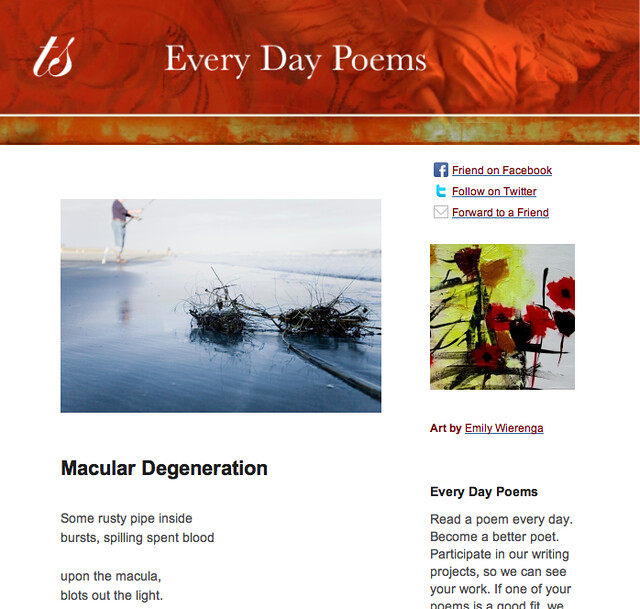I’m not sure how he found me. But I ended up publishing his poem “Macular Degeneration” in Every Day Poems. I’m glad I did.
The poem wasn’t complicated, but it was very human. And this is part of how I choose poems to publish. Of course I love technical facility, but I do not publish poems that trot it out and forget the human touch.
Two of our Every Day subscribers wrote to me about the poem. Something about it reached into them, touched their humanity. One person shared her difficult memory-dreams with me as a result. The other said the poem was already printed and carefully saved; she wondered how old the poet was.
Kilian is eighty years old. He would be touched, I think, to know that his brief words held such human power for two special readers.
The poem ends…
Yesterday I was indestructible
eighteen, the sea
was deep; today
decaying in the shallows.
It doesn’t get much more human than that.
Post by L.L. Barkat. Visit L.L. at Seedlings in Stone, for more on writing, poetry, art and life.
_____
Subscribe to Every Day Poems— Read a poem a day, become a better poet. In August we’ll be exploring sonnets.
- Found in Translation: Gently May It Sing - September 15, 2025
- Learning by Poetry: Vous venez d’où? - September 1, 2025
- 5 Fun Ways to Play with Language! - August 18, 2025


Duane Scott says
I want to read the rest of the poem.
I must have been on vacation when it was featured because I don’t recall reading it.
L. L. Barkat says
Go ahead and click on the picture of it above. It should lead you to the whole poem 🙂
John says
It had to have touched you, right? So what did it stir in you? I’ve no need to skin a poem to bones, but there is obviously something common (in the best sense of that word) that his words evoke…
Duane Scott says
Oh wow…
That was beautiful. Does Kilian write more?
Maureen Doallas says
I love McDonnell’s story, how he started writing poetry at age 75 (I sneaked a peek inside his book at Amazon), how he studied the craft, admits to having “qualms” about free verse, came to find his voice – which is marvelous – and is willing to “settle for modest success.” He’s a man I’d like to meet.
The poem here is wonderful, from its likening of the vein so central to eyesight to a “rusty pipe… spilling spent blood”, to the literal and metaphorical light being the only true constant, to that unexpected “God, like yeast,/ transforms by corruption”, and that memory of being “indestructible / eighteen”, when everything was possible. All this in just 54 words that create vivid image, leave us reflecting on the promise of what was, the “decaying in the shallows” in which we can see ourselves at the end of our own lives. There’s a giving in, an acknowledging, but certainly not a giving up; more, wonder and understanding. This can only have come from someone intimate with life and deep in its meaning.
L. L. Barkat says
John, it did. Maybe because I remember my grandmother and great Aunt succumbing to macular degeneration. Maybe because I am watching my own parents now age.
And I’m not 80, to be sure, but I relate to the sense of fragility conveyed through the broken “pipe” and the “spent blood.” I know what it’s like to feel as if I’ll be in “the deep” forever while also sensing the presence of “the shallows.”
Kilian developed these things simply through his images. That’s where the power of this poem is seated.
Thanks for asking. 🙂
And you? What do you think makes a good poem?
L. L. Barkat says
Duane, he does. This was one I liked best though. (You can click through near his name in the Every Day Poems version and it will take you to more of his work.)
Maureen, I love that. Maybe it’s also what drew me to the poem. The sense of acknowledgement but not despair.
John says
I like that you ask what makes a ‘good’ poem instead of a great or outstanding or epic poem because, for me, a good poem is a human poem…not ‘good’ in a moral sense necessarily, but in the sense that we finish a line or find ourselves arrested by a word and we say ‘wow, that’s good’, it has touched something common in us, something common to all of us be it pain or wonder or sin…and in some strange way it gives us hope because its not just me/I, but us/we…humans.
That feels muddy but maybe it makes some sense…thanks for drawing attention to his poem…its lovely.
L. L. Barkat says
John, I like this discussion. I think there are so many things on the technical level that either permit, invite, or deny our “wow.” Maybe some of the Great poems last because they achieve the human through what feels like effortless technique.
(Ah, but being one to recently try the Glass Slipper challenge, I can say that great technique is usually anything but effortless! 🙂
Claire says
This is the type of poem I want to have read at my funeral. As Maureen has noted what made this poem linger was the poet’s grip on life. He felt life deeply, rather than just existing through it. He wrestled with it, as seaweed wrestles with wave after wave before lying spent on a beach.
What makes a good poem for me is one that helps me to understand my own life experiences better; one that lingers long after I have clicked away from the page.
Diana Trautwein says
I know nothing about the technical virtues of poetry writing/reading. I just know what strikes a chord in me. And I LOVE everything this lovely man has written. I will buy writing that resonates, writing that I can read and re-read, that I can read devotionally and emotionally and ponder over and nod with. His writing does that for me. I’m not informed enough to know whether it is technically wrought well or not – but I am deeply aware of what ‘speaks’ to me. Thank you for highlighting him and his work.
Connie@raise your eyes says
After reading his piece in “Every Day Poems,” I researched his site and read more. I’m fascinated by his life story, his depth perception in several areas and how that manifests in Killian’s work.